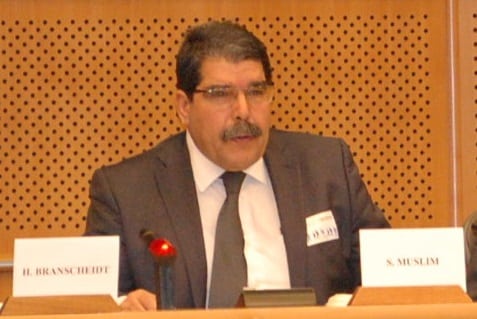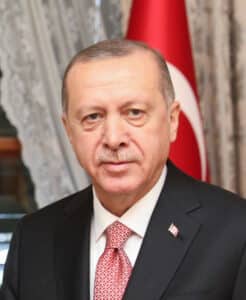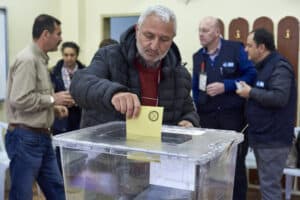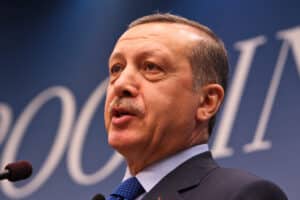In its persecution of members and associates of the Kurdistan Workers’ Party (PKK) Turkey has demanded the extradition of former co-leader of the Syrian-Kurdish PYD (Democratic Union Party) Saleh Muslim. He was arrested on 24 February in Prague upon Turkish request, but has been released on 27 February by a Czech court and is free to leave the country.
Turkish charges against Saleh Muslim include disrupting the unity and territorial integrity of the state, homicide, vandalism and transportation of harmful substances. He is one of the top “wanted terrorists” in Turkey with an reward of one million lira being offered for his capture.
Turkish government bashing the court’s decision Deputy Prime Minister Bekir Bozdağ, member of the ruling AKP, said the court’s decision was against international law and in support of terrorism. He further added: “This is a decision that will negatively affect Czech-Turkish relations. We will examine the reasons for this decision, but a terrorist leader that is active within a terrorist organization has been released. The whole world, including (the) Czech (Republic), knows that the PYD, PKK and Daesh are terrorist organizations.” The government also stated that the court’s action shows the “insincerity” of European countries regarding the fight against terrorism. EU Affairs Minister Ömer Çelik (AKP) added that Turkey is ready to fight against anyone who threatens its existence and emphasized that the country won’t give up on finding its enemies. A statement of the Czech Foreign Ministry, currently lead by Martin Stropnický, reacting to the one of the Turkish government read “The Czech Republic strongly rejects any accusation of support of international terrorism”.
Justification of the court The court decided on the release because of the non-existing threat it believes Muslim has to the public. He also promised to stay in EU territory, already having permission to travel to Finland. Additionally, he agreed on cooperating in any further investigations and being at the court’s disposal. In a statement he commented how surprised he was by the detention, because he had already travelled to several European states to attend conferences on the situation in Syria’s Afrin, but none of them were “taking it (the charges by Turkey) seriously”. Moreover he said “first of all, I am a citizen of Syria, I am not a citizen of Turkey, second thing, I am a politician”, bashing Turkey’s demands.
Turkey has now 40 days to request Muslim’s extradition with all necessary documents. But the final decision lays with the Czech Justice Minister. In the past, the Turkish government has been complaining about EU states not respecting and following their extradition requests. There have also been rumours about a prisoner exchange deal with two Czech citizens in Turkey. Turkish Justice Minister Gül denied it by saying “there is no proposal of exchange from Czech Republic. No such thing is on the agenda”.
Protests against actions of the Turkish ruling party Disapproval of Turkey’s actions have been loud. On 27 February there have been protests by PYD supporters in front of the courthouse in Prague demanding Muslim’s release. Pro-Turkish government news agency Daily Sabah called the demonstrations “pro-terrorist”. PYD’s Youth organization also held a gathering in al-Hasakah to show their support for the accused. The PYD itself published a statement on 25 February, saying the decision of even arresting Muslim was an “illegal and immoral act by Czech authorities”. It also accused Turkey of adopting “dirty methods in chasing personalities that are playing a role in the fight against terrorism”. A number of parliamentarians from all over Europe in collaboration with HDP members of the Turkish parliament declared their support too. The statement was signed by 74 representatives and says “it is urgent that we in Europe support their (PYD and Syrian Kurds) fight against extremism and an inclusive Syrian society where the rights of all ethnic and religious groups are respected”. The HDP, People’s Democratic Party, is the most influential party representing Kurds in Turkey and an associate with PES (Party of European Socialists). Since the general elections in November 2015 it lost votes but remains with 59 of 550 seats in parliament as a part of the opposition. Critics say it only serves as a voice of Kurds and not of all of Turkey. It has been trying to mediate between the outlawed and as terroristic declared PKK and the Turkish government.
Turkey has been fighting against PKK members and its Syrian counterpart the People’s Protection Unit (YPG). The latter is known to be the armed wing of PYD, of whom Muslim used to be the co-leader. Since leaving his position, he remained highly influential in issues regarding the status of Kurds and has been actively campaigning against Turkey’s operation “Olive Branch” in Syria which he believes is harming citizens. The United Nations Security Council has passed a resolution on 24 February which calls for a one-month-long ceasefire across the region excluding groups that have been declared as terrorists. Bozdağ has defended Turkish methods saying “all the claims that Turkish forces are harming civilians in Operation Olive Branch are unfounded. It is unacceptable”. He said the army was able to differentiate between civilians and militants and the ceasefire resolution does not apply to the YPG. Turkish actions have been affecting its relation to the EU and Western nations negatively since Turkey is an important NATO member who has been fighting Kurds who are in turn supported by the West.
Turkey’s next target: Germany On 3 March, Muslim was seen in Berlin demonstrating against Turkish military actions in Syria. Since then, Turkey has been demanding his extradition from Germany. Turkish Foreign Minister Mevlüt Çavuşoğlu, who has been in Berlin in the first week of March for a visit, talked to his German counterpart Sigmar Gabriel about this and other issues surrounding the relation of both countries. Gabriel stated that the request will be sent “as always” to the Justice Ministry and that it will be “examine(d) on constitutional grounds”. Çavuşoğlu later added that Turkey, at this moment, does not know where Muslim is located, because he can “unfortunately” travel freely in the EU.
Whether Muslim will be extradited or not will be decided in the coming months. The German and/or Czech decision will in every case influence EU-Turkey relations.
Sources:
Reuters Reuters I. Reuters II. al-Monitor Aljazeera Radio.cz Anfenglish Washingtonpost Hawar News Dailysabah Zeit



